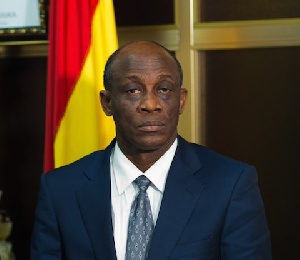 Seth Terkper, Finance Minister
Seth Terkper, Finance Minister
Be guided, and not put off by budget statements, says Bernard Otabil.
As we prepare for another budget statement by the Government, this time looking at 2017, there is every reason for you to be curious. Of course you must be probing because every aspect of the budget affects you as the national budget is your budget too.
For instance, if in the budget the threshold of VAT is raised or lowered, it has an impact on your pocket, or, if the government decides to give incentives to a particular sector of the economy in order to boost investment in that sector, it increases your investment opportunities too.
These are just two of the many examples that prove that the national budget is not just a blueprint for “Government” but also your budget too. The direction set by the budget must inform your own personal budget and financial planning too.
The sad reality, however, is that we live in a part of the world where even before the budget statement is presented to those who need to know, for example parliament, there are already recriminations.
The blame may start from, sometimes an uninformed position, thereby reducing the importance of the budget document and the budget process itself to tatters.
That agenda, when latched on by the media, creates a state of uneasiness, causing the citizenry to lose interest in the budget, consequentially, in the country. But that is not the way for us to go as a country, and as a group with a committed goal, that onerous aim of developing a prosperous nation that creates everything for the common good.
Economic growth is a shared responsibility that we can all galvanise, rallying behind which ever government is in power, offering the right support so that we can all enjoy the good life that we want.
Talking down on the economy won’t necessarily bring us up as it will rather wear us down. For, some of the spin on the glaring economic facts often leaves much to be desired, generally.
And should it be all about political expediency all the time? What happened to nationalism? What happened to our pledge to be faithful and loyal to our country?
If you are consumed by some of the political schemes, then take note of the following: In times past, by the way they dressed and spoke you could tell which political ideology they belonged to. But today we have Mercedes Benz driving socialists, yet we are we still fighting over ideology. It’s about policies! Please.
The truth is, our economy is such that you cannot, as a government, lean fully towards capitalism or socialism. There are political parties that profess to be socialists but implement policies that only die-hard capitalist leaning parties would implement. And the reverse is also true.
The other truth also is that a bad country or, in other words, bad economic policies affects all.
Take the case of the global financial crises that was mostly a Western-style financial indiscipline that came to a boil in 2007 and yet the whole world caught the virus. Everyone suffered, and most developing countries are still in it because the donor support has dried up because of problems facing the donors themselves.
That is the reality and the reason why the path to growth is a shared responsibility.
Okay. Now this is the rallying call. And the call is about how you should treat economic information provided by the economic managers of the country with all the necessary attention. When you follow only the spin, you end up getting lost in the maze of the wrong information. There are opportunities that lie hidden in the money that you have, no matter how little it may appear.
If you may recall, two weeks ago l wrote about the efforts made by a bank and a telecommunications company to ensure that from your mobile wallet you can also become an investor in Treasury Bills. Yes, from as little as five cedis you can also start a journey to financial freedom. There is no need to sit on the sidelines anymore.
There may be challenges facing the economy but books on perfect conditions before investment are rarely masterpieces. Rather, we are all attracted to learning from those who made it when seemingly all was against them. We pay huge sums of money to dinner events to listen to how these people made it; why they were fearless when others were fearful.
Let me drum home what l stated here just some few weeks back: In Coriolanus, Shakespeare wrote, “When the sea was calm all boats alike Show’d mastership in floating.” Rough seas will cause some ships to sink for sure. That defines the true sailors and the pretenders. Referencing this to the world of finance, what it means is that when conditions are “perfect” we can all become businessmen and businesswomen of repute! We can all boast of something.
However, perfect conditions are rare, not even in advanced countries. Even though admittedly some countries offer better opportunities than others, they can never describe themselves as near perfect. The other truth also is that even though countries may go through some crisis of some sort, people still buy things; they just become more particular about what they need.
That means that things getting better may only mean that the opportunity is gone, if you are waiting for it to happen. And that is the reason why some people are more successful than others; they are more prepared to take risks, are more enterprising and are ready to take advantage of opportunities.
The budget will surely have opportunities that you can exploit so listen to the experts so that you can benefit from it too.